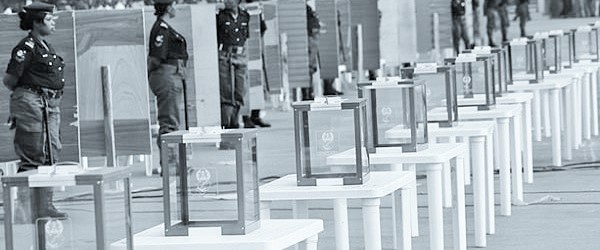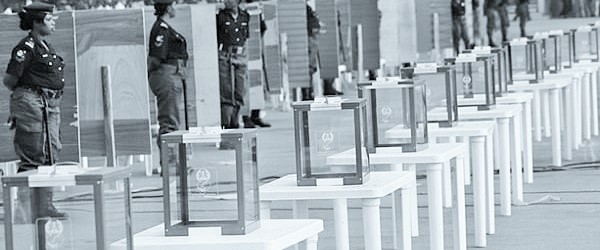
Nigeria’s election poll on Saturday for both president as well as parliament is a close competition for election. The election campaigns were completely ruled by slowdown in economy and a battle against Islam militants. The stability of the economy worth $500 billion is being tested by the elections. Africa’s largest economy, Nigeria is being hit by collapse in crude oil prices and weakened currency.
With continuous attacks, Boko Haram, the Islamist militant group have killed nearly 1,000 civilians so far this year according to Human Rights Watch. Hence, the elections got delayed by almost 6 weeks as the government required some time to suppress the rebels. Initially, the election were scheduled for 14 February which was postponed.
President Goodluck Jonathan, a Christian from Niger river delta is a presidential candidate for elections. He belongs to People’s Democratic Party and gained huge popularity in 2011. Recently, his popularity is constantly sinking, as he failed to deliver the promised change. The party has been governing Nigeria since 1999, when the military rule came to an end. Many officials from People’s Democratic Party have shifted to the new All Progressives Congress. The party is facing strong opposition from Muhammadu Buhari, a former military dictator. Buhari has ruled Nigeria in 1980’s and was known for his strict regime. Besides, the Presidential elections, the ballot also includes election of governors in 36 states.
There are high possibilities of violence after election results. No matter whoever becomes the new President, the difficulties will be continuing and pose threat for Nigerian economic prospect this year. The economy is highly dependent on oil sector, and this is not going to change even after elections. The most vital issue will be to tackle the effect of shrinking oil prices. Nigeria is in need of structural reforms that facilitates the government in diversifying the sources of revenue. However, weaker infrastructures will also hinder successful implementation of reforms.
With continuous attacks, Boko Haram, the Islamist militant group have killed nearly 1,000 civilians so far this year according to Human Rights Watch. Hence, the elections got delayed by almost 6 weeks as the government required some time to suppress the rebels. Initially, the election were scheduled for 14 February which was postponed.
President Goodluck Jonathan, a Christian from Niger river delta is a presidential candidate for elections. He belongs to People’s Democratic Party and gained huge popularity in 2011. Recently, his popularity is constantly sinking, as he failed to deliver the promised change. The party has been governing Nigeria since 1999, when the military rule came to an end. Many officials from People’s Democratic Party have shifted to the new All Progressives Congress. The party is facing strong opposition from Muhammadu Buhari, a former military dictator. Buhari has ruled Nigeria in 1980’s and was known for his strict regime. Besides, the Presidential elections, the ballot also includes election of governors in 36 states.
There are high possibilities of violence after election results. No matter whoever becomes the new President, the difficulties will be continuing and pose threat for Nigerian economic prospect this year. The economy is highly dependent on oil sector, and this is not going to change even after elections. The most vital issue will be to tackle the effect of shrinking oil prices. Nigeria is in need of structural reforms that facilitates the government in diversifying the sources of revenue. However, weaker infrastructures will also hinder successful implementation of reforms.
It has been for the first time ever in Nigeria’s history that the presidential voting is having very close competition. Nigerian elections are generally spoiled by widespread rigging but this time biometric cards are used for voting across the entire Nigeria. However, some parts of Nigeria has witnessed difficulty in voting due to problems encountered with the new card readers. As a result, the elections were extended through Sunday. Although the Nigerian political system has been ruled by PDP since 1999, but this time All Progressive Congress Party’s General Buhari is considered as a severed threat.
In Nigerian elections, biometric voter’s card was used for the first time. The rising tensions in Niger river have fuelled the fears of a disputed result that occurred after the previous elections that was held in 2011. During that point, almost 800 people were killed. However, there are indications that the places where final counting of votes will take place, are subject to political interference. Nigeria is clouded by increasing fear that the election might end into a violence and disputed election results.


















